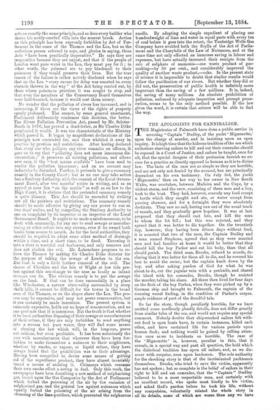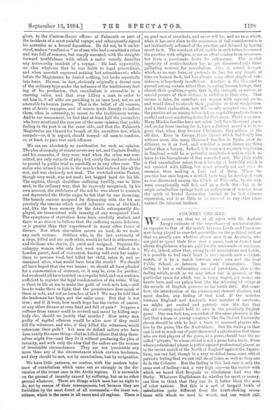THE APOLOGISTS FOB CANNIBALISM.
THE Magistrates of Falmouth have done a public service in arresting " Captain " Dudley, of the yacht Mignonette,' upon the charge of murder, and in insisting upon an open inquiry. It ishigh time that the hideous tradition of the sea which authorises starving sailors to kill and eat their comrades should be exposed in a Court of Justice, and sailors be taught, once for all, that the special dangers of their profession furnish no ex- cuse for a practice as directly opposed to human as it is to divine law. The facts of the case are as simple as they are horrible, and are not only not denied by the accused, but are principally dependent on his own testimony. On July 3rd, the yacht
Mignonette,' then on her way to her owner in New South Wales, was overtaken, between Madeira and the Cape, by a violent storm, and the crew, consisting of three men and a boy, took to the boat. They had, however, scarcely any food except a turtle which they caught and ate, or water except from passing showers, and for a fortnight they were absolutely destitute. They saw no sail, having run out of the usual track of vessels, and they gradually grew hopeless. It was at last proposed that they should cast lots, and kill the man to whom the lot fell ; but this was rejected, and they agreed that it was better to die together. On the twentieth day, however, they having been fifteen days without food, it is asserted that two of the men, the Captain Dudley and a man named Stephens, agreed that as they were married men and had families at home it would be better that they should kill the boy Parker and eat his body, than that all should perish. The third man, Brooks, refused to accede, de- claring that it was better for them all to die, and he covered his face to avoid the scene; but the captain knelt down by the boy, and after asking pardon of God for what he was about to do, cut the jugular vein with a penknife, and shared the blood with his comrades, Brooks, though he resisted the murder, taking his share. All three then lived for four days on the flesh of the boy Parker, when they were picked up by a German ship and brought to Falmouth, the captain of the rescuing vessel finding, in the condition of Parker's corpse. ample evidence of part of the dreadful tale.
So far the story, though peculiarly horrible, for we have omitted some needlessly ghastly details, does not differ greatly from similar tales of the sea, and would not require any special comment. Nobody doubts that shipwrecked sailors left with- out food in open boats hare, in certain instances, killed each other, and have sustained life for various periods upon human flesh; and nothing would be gained by calling atten- tion once mare to incidents so horrible. The case of the 'Mignonette' is, however, peculiar in this, that it reveals, in a special way and past all question, the hold which the diabolical tradition has upon all sailors, and, as we dis- cover with surprise, even upon landsmen. The sole authority for the shocking story is that of the incriminated yachtsmen themselves. Brooks, who tried to save the victim, apparently has not spoken ; but so complete is the belief of sailors in their right to kill and eat comrades, that the " Captain " Dudley believed to be a most respectable man, and certainly with an excellent record, who spoke most kindly to his victim, and asked God's pardon before he took his life, without any compulsion, voluntarily related the whole story in all its details, some of which are worse than any we have
given, to the Custom-House officers at Falmouth as part of the incidents of a most painful voyage, and subsequently signed his narrative as a formal deposition. He did not, be it under- stood, make a "confession" as of one who had committed a crime and was full of remorse, but simply narrated, with the straight- forward truthfulness with which a sailor usually describes any noteworthy incident of a voyage. He had, apparently, no idea whatever that he was liable to legal proceedings, and when arrested expressed nothing but astonishment ; while before the Magistrates he denied nothing, but broke repeatedly into tears. He was, in fact, obviously originally a decent man of the ordinary type under the influence of the traditionary feel- ing of his profession, that cannibalism is excusable in a starving sailor, and that even killing a man in order to eat him is, if all alike are perishing in an open boat, not an act amenable to human justice. That is the belief of all seamen, even of Arctic voyagers, and of course tends directly to induce them, when in extremity, to resort to the traditionary means. And to our amazement, we find that at least half the journalists who have mentioned the case are of the same opinion, that public feeling in the port is on the same side, and that the Falmouth Magistrates are blamed for breach of the unwritten law, which compels—or, it is argued, should compel—all men to condone, or, at least, to pass over such offences.
We can see absolutely no justification for such an opinion. The plea of insanity of course covers any act, and Captain Dudley and his comrades, if they were mad when the crime was com- mitted, are only subjects of pity ; but surely the madness should be proved by public trial as carefully as in any other case. The sailor who refused to join in the murder had suffered like all the rest, and was obviously not mad. The wretched victim Parker, though very weak, was not mad ; but begged hard for his life. The captain, though doubtless suffering terribly, was so little mad, in the ordinary way, that he expressly recognised, by his own account, the sinfulness of the act he was about to commit, and deprecated the Divine anger he felt that he was incurring. The homely reasons assigned for dispensing with the lot are precisely the reasons which would influence men of the kind; and, like the keen memory for the details subsequently dis- played, are inconsistent with insanity of any recognised kind. The symptoms of starvation have been carefully studied, and there is no reason to believe that the suffering causes delirium, or is greater than that experienced in many other forms of disease. Nor when starvation occurs on land, do we make any such excuses. Soldiers who, in the last extremity of a siege, killed and ate each other, would be held in abhorrence ; and civilians who starve, die quiet and resigned. Suppose the unhappy woman who only last week was found naked in a London garret, dead of starvation, having sold even her under- linen to procure food, had killed her child, eaten it, and so remained alive, what would have been the result? We should all have hoped that she was insane ; we should all have pleaded for a commutation of sentence, or, it may be, even for pardon ; but we should all have insisted on a regular trial, and on a sentence sufficient to register the legal condemnation of the crime. What is there in life at sea to make the guilt of such acts less,—still less to make them so light that the perpetrators dare speak of them as acts, and not as breaches of law ? We may be told that the landsman has hope, and the sailor none. But that is not true ; and if it were, how much hope has the victim of cancer, or any other disease at once fatal and full of pain Suppose a sufferer from cancer could be revived and saved by killing any- body else, should we justify that murder ? How many men guilty of capital offences would be alive now if they could kill the witnesses, and who, if they killed the witnesses, would extenuate their guilt Yet men do defend sailors who have done nearly the same thing—that is, killed others that they them- selves might live—and they do it without producing the plea of insanity, and with only the idea that the sailors are the victims of irresistible circumstances. They are not irresistible any more than any of the circumstances which envixon landsmen, and they should be met, not by cannibalism, but by resignation.
We have little patience, we confess, with the modern toler- ance of cannibalism which came out so strongly in the dis- cussion of the recent case in the Arctic regions. It is excusable . on the ground of insanity caused by suffering, but on no other ground whatever. There are things which man has no right to do, not by reason of their consequences, but because they are forbidden by the most direct of all commands,—the inner con- science, which is the same in all races and all regions. There is
no good race of cannibals, and never will be ; and no race which, when it has once risen to the possession of full consciousness, is not instinctively ashamed of the practice, and debased by having resort to it. The constant effort visible in such tribes to connect the practice with religion, is not an effort arising from reverence, but from a passionate desire for self-excuse. The morbid ingenuity of motive-hunters has as yet discovered only three palliating motives for cannibalism. One is actual hunger. which, as no race lives, or pretends to live, for any length of time on human flesh, but has always some other staple of sub- sistence, is hopelessly insufficient. Another is the idea said to prevail among certain tribes that, in eating human beings, they absorb their qualities,—gain, that is, the strength, or valour, or special powers of their victims, in addition to their own. That excuse is false, for cannibals eat women with especial gusto, and would dread to absorb their .qualities or their weaknesses. And a third explanation, now the usually accepted one, is that the practice arises among tribes fed on vegetable products from a morbid and over-mastering desire for flesh meat. That is nonsense Many Hindoo families have not eaten flesh for a thousand years and, so far from craving for it, have a distinct aversion to it, so great that, when they become Christians, they adhere to the old diet. Even in Europe, those classes which habitually live without meat, like many thousand families in Spain, grow in- different to it as food, and consider a meat dinner anything rather than a luxury. Indeed, if it were not so, every vegetarian in England would be a potential cannibal—a notion which we leave to the hierophants of that conceited sect. The plain truth is that cannibalism arises from a ferocity of brutality which is not satiated with killing, but must actually cat and eject its enemies, thus making a final end of them. Whoa the practice has once began, a morbid taste may be developed, such as was discovered among the Chiefs of Fiji—who, by the way, were exceptionally well fed, and on a flesh diet—but in its origin cannibalism springs from an enthusiasm of murder, from the spirit of brutal destruction carried to its last extreme expression, and is as little to be excused as any other crime against the inherent instinct.



































 Previous page
Previous page